Lean as Quality Management: Methodology, Philosophy, or Both?
VerifiedAdded on 2023/04/22
|7
|1188
|452
Essay
AI Summary
This essay examines the concept of 'Lean' within the context of quality management, debating whether it functions primarily as a methodology or a philosophy. It defines Lean as a strategy for enhancing productivity by minimizing waste and maximizing resource utilization, particularly within small and medium-sized enterprises (SMEs). The essay discusses how Lean principles, initially applied in manufacturing, have expanded to diverse sectors like finance and healthcare. It explores the evolution of Lean into a philosophy, especially in core manufacturing and construction industries, while acknowledging the need for creative employee input to deliver value-based solutions. The essay highlights key features of Lean, including pull production, understanding customer value, value stream mapping, waste elimination, and continuous improvement. It concludes by emphasizing the benefits of Lean in improving profitability, customer satisfaction, and operational efficiency.
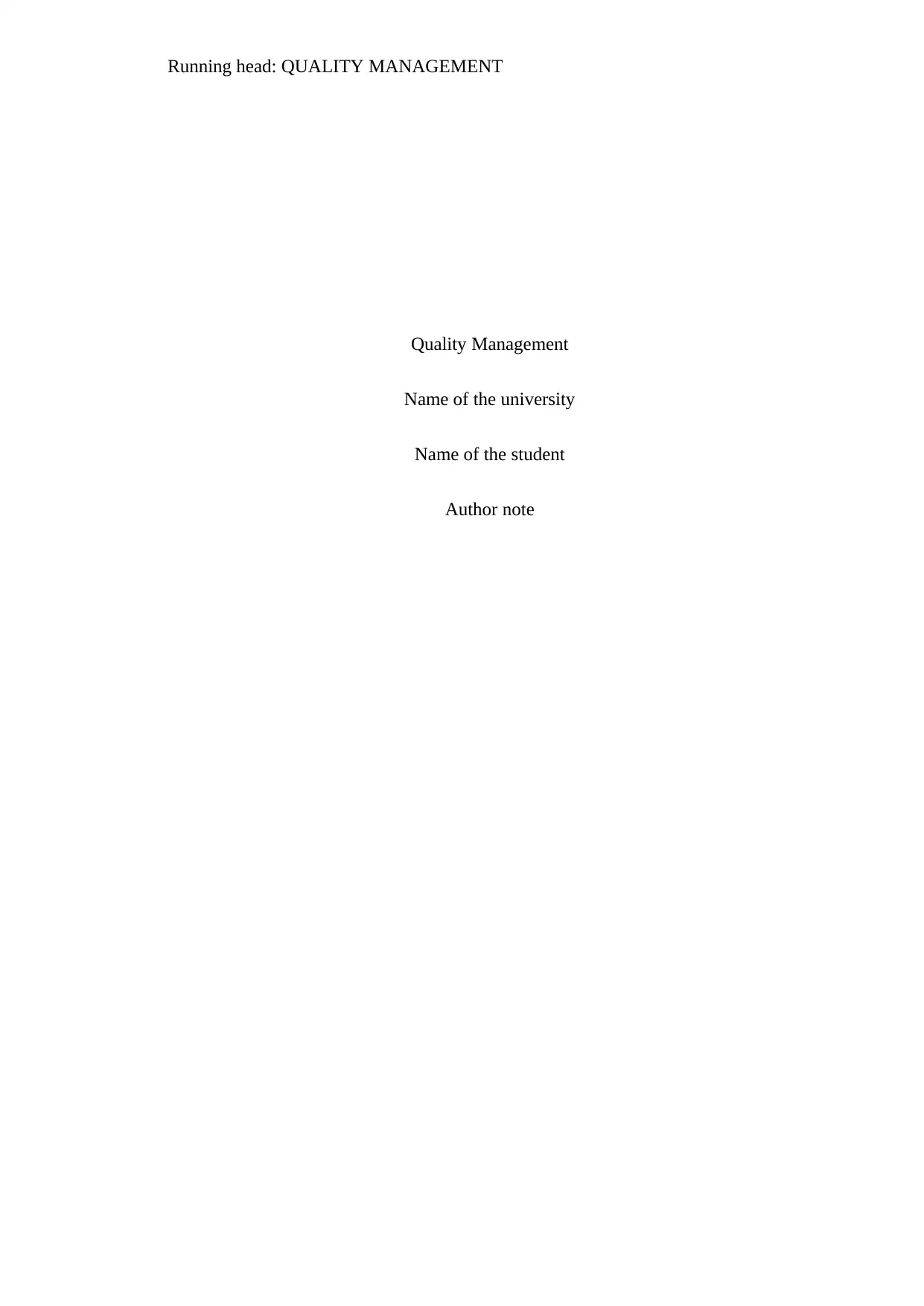
Running head: QUALITY MANAGEMENT
Quality Management
Name of the university
Name of the student
Author note
Quality Management
Name of the university
Name of the student
Author note
Paraphrase This Document
Need a fresh take? Get an instant paraphrase of this document with our AI Paraphraser
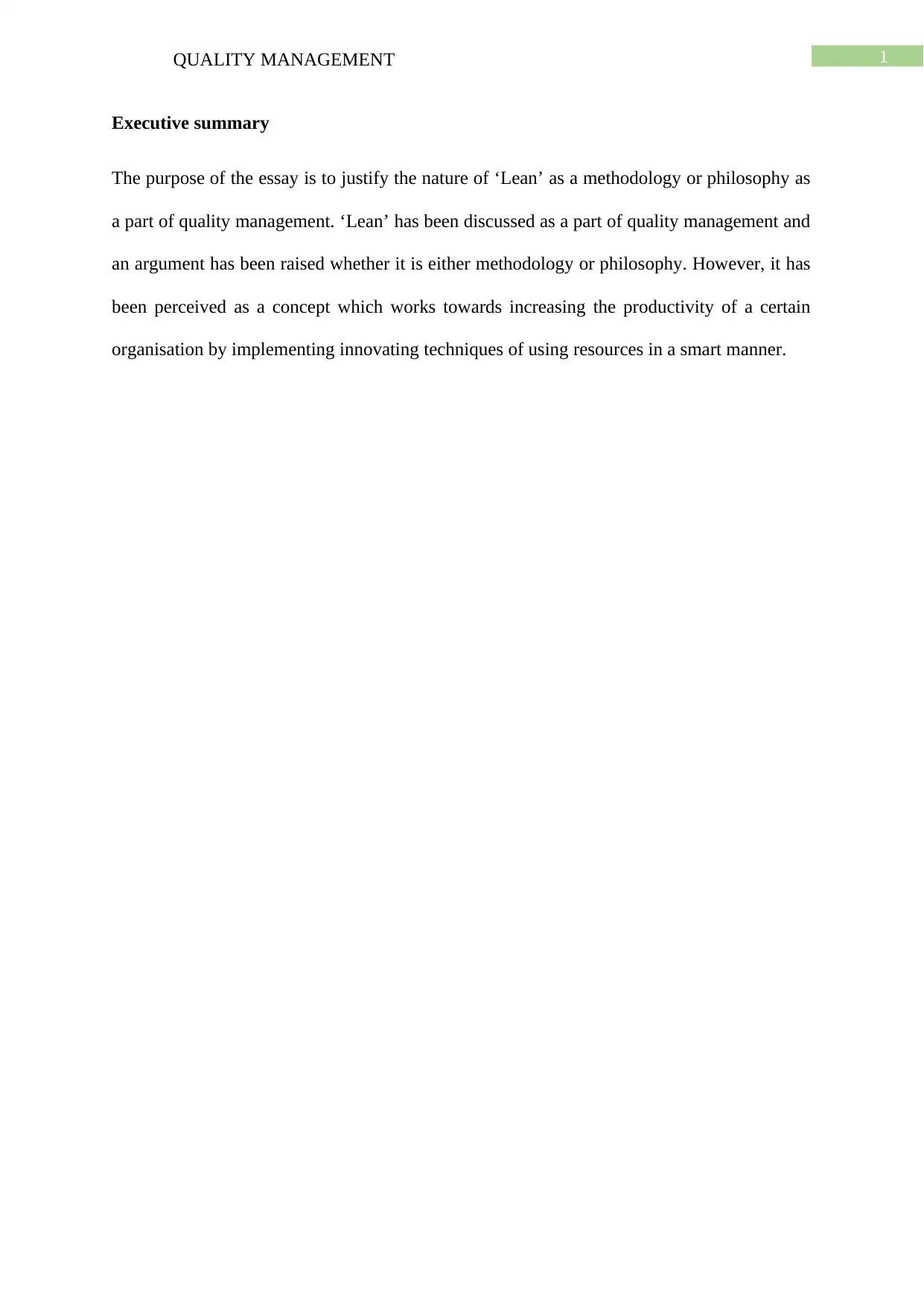
1QUALITY MANAGEMENT
Executive summary
The purpose of the essay is to justify the nature of ‘Lean’ as a methodology or philosophy as
a part of quality management. ‘Lean’ has been discussed as a part of quality management and
an argument has been raised whether it is either methodology or philosophy. However, it has
been perceived as a concept which works towards increasing the productivity of a certain
organisation by implementing innovating techniques of using resources in a smart manner.
Executive summary
The purpose of the essay is to justify the nature of ‘Lean’ as a methodology or philosophy as
a part of quality management. ‘Lean’ has been discussed as a part of quality management and
an argument has been raised whether it is either methodology or philosophy. However, it has
been perceived as a concept which works towards increasing the productivity of a certain
organisation by implementing innovating techniques of using resources in a smart manner.
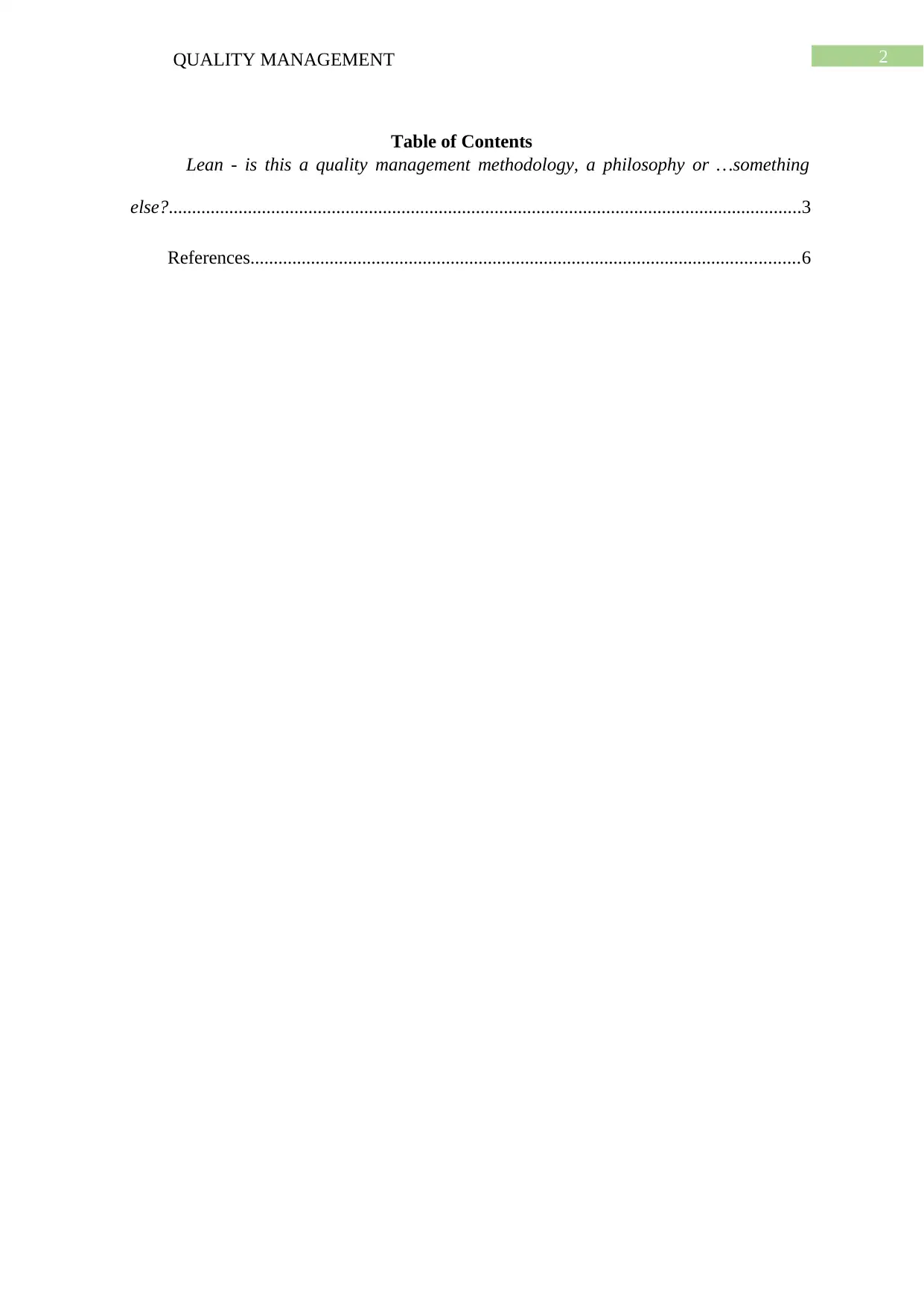
2QUALITY MANAGEMENT
Table of Contents
Lean - is this a quality management methodology, a philosophy or …something
else?........................................................................................................................................3
References......................................................................................................................6
Table of Contents
Lean - is this a quality management methodology, a philosophy or …something
else?........................................................................................................................................3
References......................................................................................................................6
⊘ This is a preview!⊘
Do you want full access?
Subscribe today to unlock all pages.

Trusted by 1+ million students worldwide
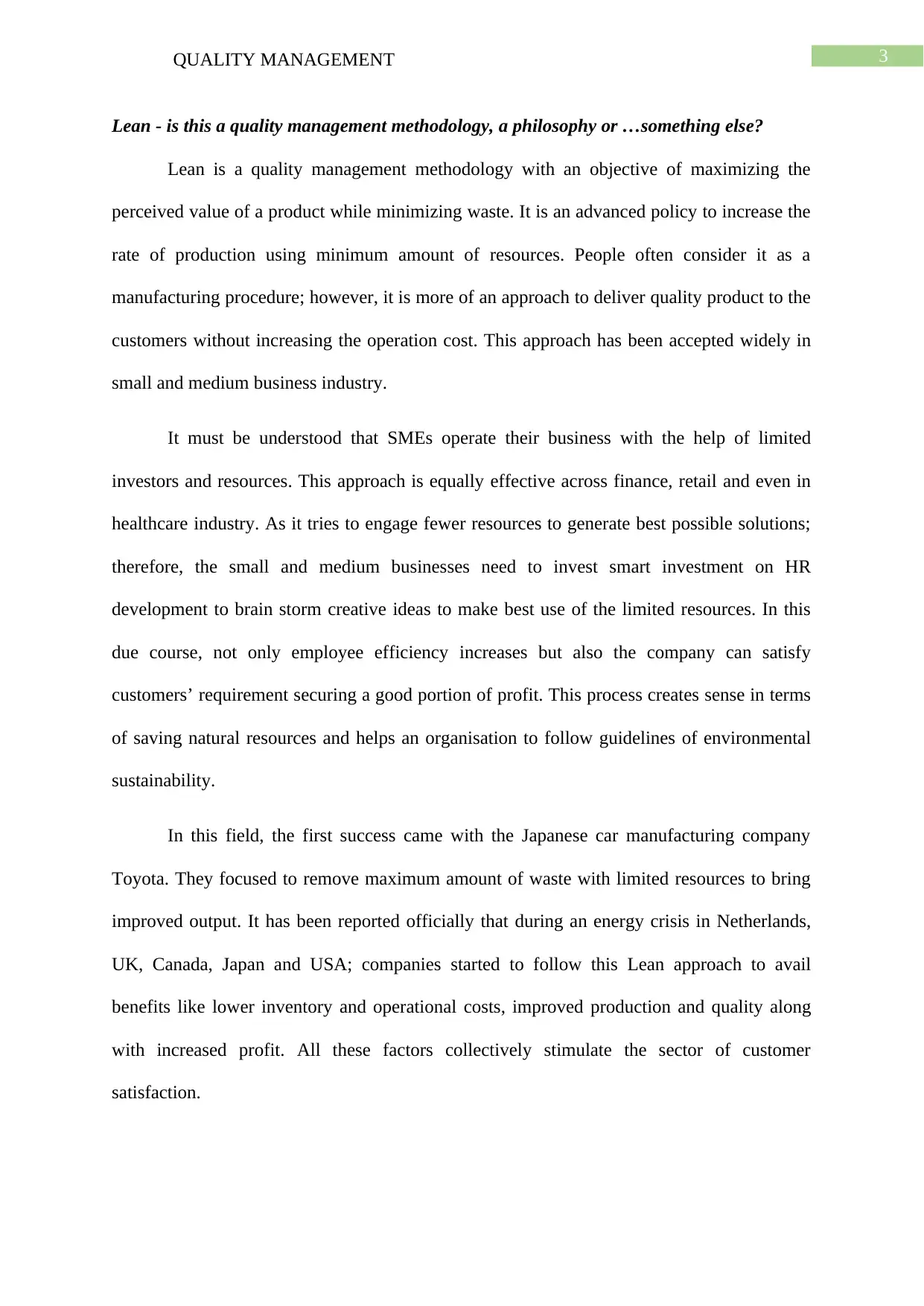
3QUALITY MANAGEMENT
Lean - is this a quality management methodology, a philosophy or …something else?
Lean is a quality management methodology with an objective of maximizing the
perceived value of a product while minimizing waste. It is an advanced policy to increase the
rate of production using minimum amount of resources. People often consider it as a
manufacturing procedure; however, it is more of an approach to deliver quality product to the
customers without increasing the operation cost. This approach has been accepted widely in
small and medium business industry.
It must be understood that SMEs operate their business with the help of limited
investors and resources. This approach is equally effective across finance, retail and even in
healthcare industry. As it tries to engage fewer resources to generate best possible solutions;
therefore, the small and medium businesses need to invest smart investment on HR
development to brain storm creative ideas to make best use of the limited resources. In this
due course, not only employee efficiency increases but also the company can satisfy
customers’ requirement securing a good portion of profit. This process creates sense in terms
of saving natural resources and helps an organisation to follow guidelines of environmental
sustainability.
In this field, the first success came with the Japanese car manufacturing company
Toyota. They focused to remove maximum amount of waste with limited resources to bring
improved output. It has been reported officially that during an energy crisis in Netherlands,
UK, Canada, Japan and USA; companies started to follow this Lean approach to avail
benefits like lower inventory and operational costs, improved production and quality along
with increased profit. All these factors collectively stimulate the sector of customer
satisfaction.
Lean - is this a quality management methodology, a philosophy or …something else?
Lean is a quality management methodology with an objective of maximizing the
perceived value of a product while minimizing waste. It is an advanced policy to increase the
rate of production using minimum amount of resources. People often consider it as a
manufacturing procedure; however, it is more of an approach to deliver quality product to the
customers without increasing the operation cost. This approach has been accepted widely in
small and medium business industry.
It must be understood that SMEs operate their business with the help of limited
investors and resources. This approach is equally effective across finance, retail and even in
healthcare industry. As it tries to engage fewer resources to generate best possible solutions;
therefore, the small and medium businesses need to invest smart investment on HR
development to brain storm creative ideas to make best use of the limited resources. In this
due course, not only employee efficiency increases but also the company can satisfy
customers’ requirement securing a good portion of profit. This process creates sense in terms
of saving natural resources and helps an organisation to follow guidelines of environmental
sustainability.
In this field, the first success came with the Japanese car manufacturing company
Toyota. They focused to remove maximum amount of waste with limited resources to bring
improved output. It has been reported officially that during an energy crisis in Netherlands,
UK, Canada, Japan and USA; companies started to follow this Lean approach to avail
benefits like lower inventory and operational costs, improved production and quality along
with increased profit. All these factors collectively stimulate the sector of customer
satisfaction.
Paraphrase This Document
Need a fresh take? Get an instant paraphrase of this document with our AI Paraphraser
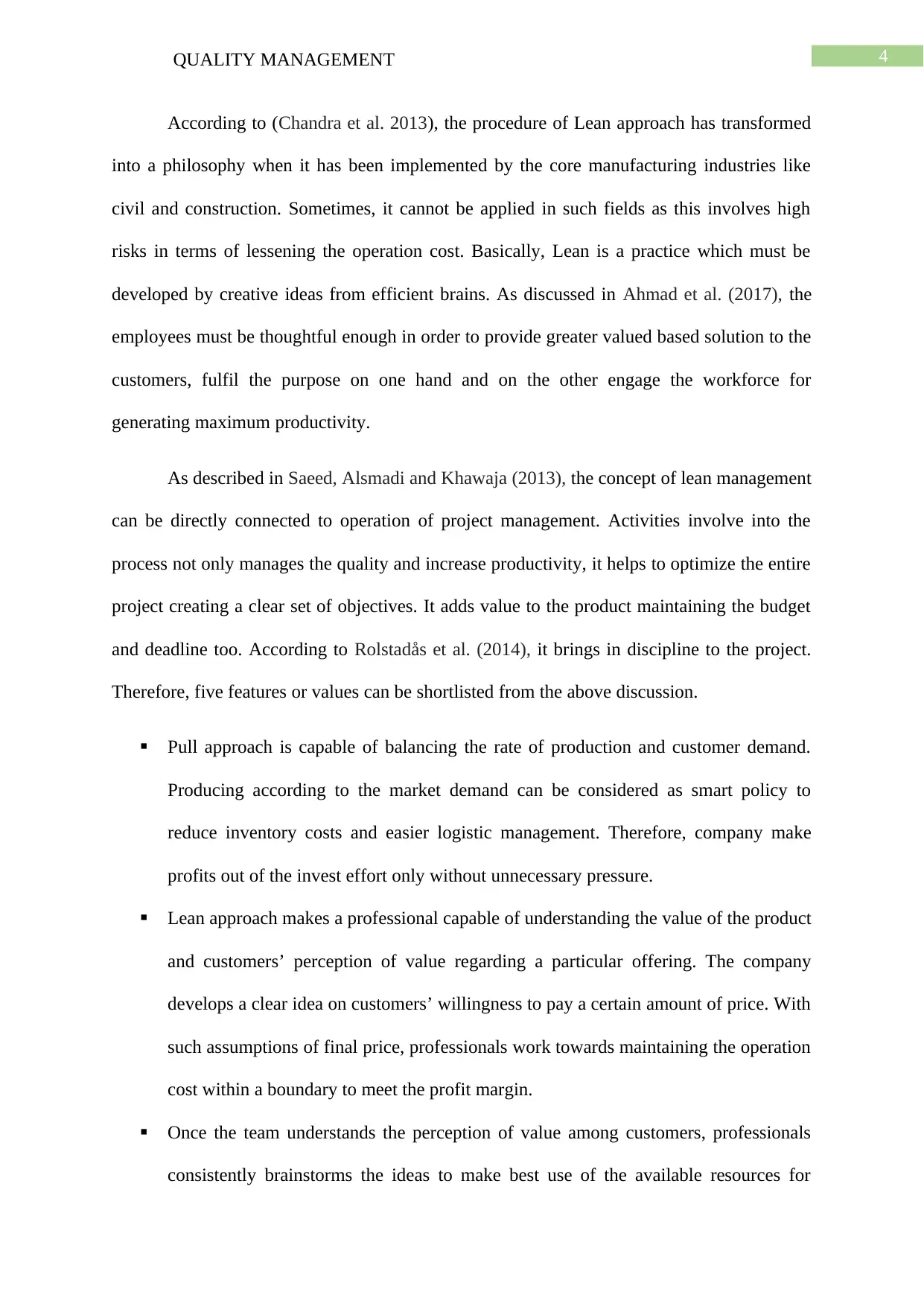
4QUALITY MANAGEMENT
According to (Chandra et al. 2013), the procedure of Lean approach has transformed
into a philosophy when it has been implemented by the core manufacturing industries like
civil and construction. Sometimes, it cannot be applied in such fields as this involves high
risks in terms of lessening the operation cost. Basically, Lean is a practice which must be
developed by creative ideas from efficient brains. As discussed in Ahmad et al. (2017), the
employees must be thoughtful enough in order to provide greater valued based solution to the
customers, fulfil the purpose on one hand and on the other engage the workforce for
generating maximum productivity.
As described in Saeed, Alsmadi and Khawaja (2013), the concept of lean management
can be directly connected to operation of project management. Activities involve into the
process not only manages the quality and increase productivity, it helps to optimize the entire
project creating a clear set of objectives. It adds value to the product maintaining the budget
and deadline too. According to Rolstadås et al. (2014), it brings in discipline to the project.
Therefore, five features or values can be shortlisted from the above discussion.
Pull approach is capable of balancing the rate of production and customer demand.
Producing according to the market demand can be considered as smart policy to
reduce inventory costs and easier logistic management. Therefore, company make
profits out of the invest effort only without unnecessary pressure.
Lean approach makes a professional capable of understanding the value of the product
and customers’ perception of value regarding a particular offering. The company
develops a clear idea on customers’ willingness to pay a certain amount of price. With
such assumptions of final price, professionals work towards maintaining the operation
cost within a boundary to meet the profit margin.
Once the team understands the perception of value among customers, professionals
consistently brainstorms the ideas to make best use of the available resources for
According to (Chandra et al. 2013), the procedure of Lean approach has transformed
into a philosophy when it has been implemented by the core manufacturing industries like
civil and construction. Sometimes, it cannot be applied in such fields as this involves high
risks in terms of lessening the operation cost. Basically, Lean is a practice which must be
developed by creative ideas from efficient brains. As discussed in Ahmad et al. (2017), the
employees must be thoughtful enough in order to provide greater valued based solution to the
customers, fulfil the purpose on one hand and on the other engage the workforce for
generating maximum productivity.
As described in Saeed, Alsmadi and Khawaja (2013), the concept of lean management
can be directly connected to operation of project management. Activities involve into the
process not only manages the quality and increase productivity, it helps to optimize the entire
project creating a clear set of objectives. It adds value to the product maintaining the budget
and deadline too. According to Rolstadås et al. (2014), it brings in discipline to the project.
Therefore, five features or values can be shortlisted from the above discussion.
Pull approach is capable of balancing the rate of production and customer demand.
Producing according to the market demand can be considered as smart policy to
reduce inventory costs and easier logistic management. Therefore, company make
profits out of the invest effort only without unnecessary pressure.
Lean approach makes a professional capable of understanding the value of the product
and customers’ perception of value regarding a particular offering. The company
develops a clear idea on customers’ willingness to pay a certain amount of price. With
such assumptions of final price, professionals work towards maintaining the operation
cost within a boundary to meet the profit margin.
Once the team understands the perception of value among customers, professionals
consistently brainstorms the ideas to make best use of the available resources for
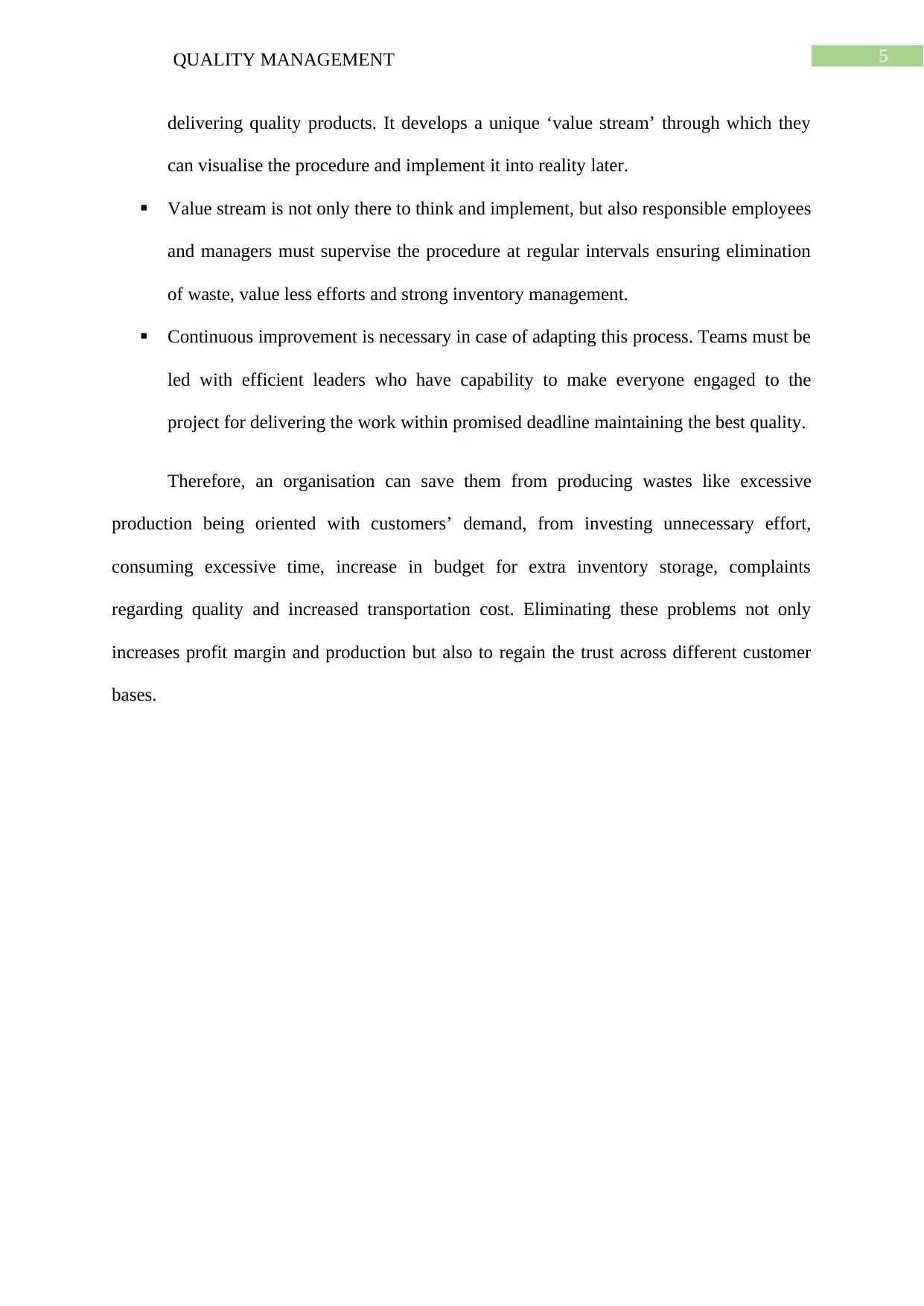
5QUALITY MANAGEMENT
delivering quality products. It develops a unique ‘value stream’ through which they
can visualise the procedure and implement it into reality later.
Value stream is not only there to think and implement, but also responsible employees
and managers must supervise the procedure at regular intervals ensuring elimination
of waste, value less efforts and strong inventory management.
Continuous improvement is necessary in case of adapting this process. Teams must be
led with efficient leaders who have capability to make everyone engaged to the
project for delivering the work within promised deadline maintaining the best quality.
Therefore, an organisation can save them from producing wastes like excessive
production being oriented with customers’ demand, from investing unnecessary effort,
consuming excessive time, increase in budget for extra inventory storage, complaints
regarding quality and increased transportation cost. Eliminating these problems not only
increases profit margin and production but also to regain the trust across different customer
bases.
delivering quality products. It develops a unique ‘value stream’ through which they
can visualise the procedure and implement it into reality later.
Value stream is not only there to think and implement, but also responsible employees
and managers must supervise the procedure at regular intervals ensuring elimination
of waste, value less efforts and strong inventory management.
Continuous improvement is necessary in case of adapting this process. Teams must be
led with efficient leaders who have capability to make everyone engaged to the
project for delivering the work within promised deadline maintaining the best quality.
Therefore, an organisation can save them from producing wastes like excessive
production being oriented with customers’ demand, from investing unnecessary effort,
consuming excessive time, increase in budget for extra inventory storage, complaints
regarding quality and increased transportation cost. Eliminating these problems not only
increases profit margin and production but also to regain the trust across different customer
bases.
⊘ This is a preview!⊘
Do you want full access?
Subscribe today to unlock all pages.

Trusted by 1+ million students worldwide
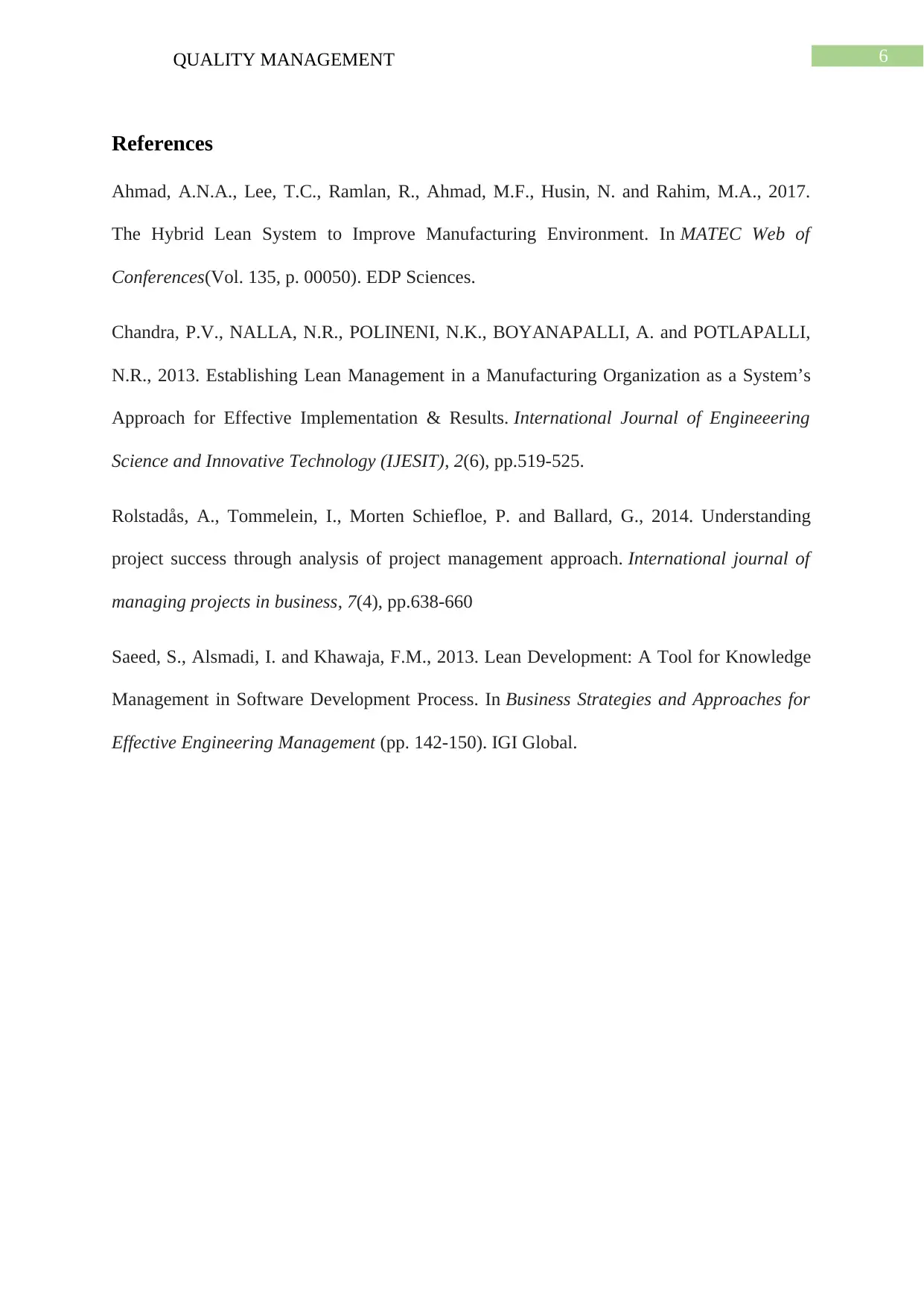
6QUALITY MANAGEMENT
References
Ahmad, A.N.A., Lee, T.C., Ramlan, R., Ahmad, M.F., Husin, N. and Rahim, M.A., 2017.
The Hybrid Lean System to Improve Manufacturing Environment. In MATEC Web of
Conferences(Vol. 135, p. 00050). EDP Sciences.
Chandra, P.V., NALLA, N.R., POLINENI, N.K., BOYANAPALLI, A. and POTLAPALLI,
N.R., 2013. Establishing Lean Management in a Manufacturing Organization as a System’s
Approach for Effective Implementation & Results. International Journal of Engineeering
Science and Innovative Technology (IJESIT), 2(6), pp.519-525.
Rolstadås, A., Tommelein, I., Morten Schiefloe, P. and Ballard, G., 2014. Understanding
project success through analysis of project management approach. International journal of
managing projects in business, 7(4), pp.638-660
Saeed, S., Alsmadi, I. and Khawaja, F.M., 2013. Lean Development: A Tool for Knowledge
Management in Software Development Process. In Business Strategies and Approaches for
Effective Engineering Management (pp. 142-150). IGI Global.
References
Ahmad, A.N.A., Lee, T.C., Ramlan, R., Ahmad, M.F., Husin, N. and Rahim, M.A., 2017.
The Hybrid Lean System to Improve Manufacturing Environment. In MATEC Web of
Conferences(Vol. 135, p. 00050). EDP Sciences.
Chandra, P.V., NALLA, N.R., POLINENI, N.K., BOYANAPALLI, A. and POTLAPALLI,
N.R., 2013. Establishing Lean Management in a Manufacturing Organization as a System’s
Approach for Effective Implementation & Results. International Journal of Engineeering
Science and Innovative Technology (IJESIT), 2(6), pp.519-525.
Rolstadås, A., Tommelein, I., Morten Schiefloe, P. and Ballard, G., 2014. Understanding
project success through analysis of project management approach. International journal of
managing projects in business, 7(4), pp.638-660
Saeed, S., Alsmadi, I. and Khawaja, F.M., 2013. Lean Development: A Tool for Knowledge
Management in Software Development Process. In Business Strategies and Approaches for
Effective Engineering Management (pp. 142-150). IGI Global.
1 out of 7
Related Documents
Your All-in-One AI-Powered Toolkit for Academic Success.
+13062052269
info@desklib.com
Available 24*7 on WhatsApp / Email
![[object Object]](/_next/static/media/star-bottom.7253800d.svg)
Unlock your academic potential
Copyright © 2020–2025 A2Z Services. All Rights Reserved. Developed and managed by ZUCOL.





